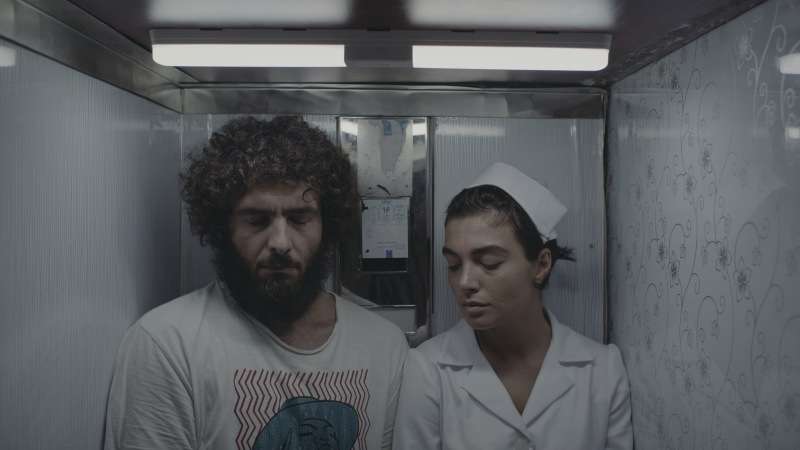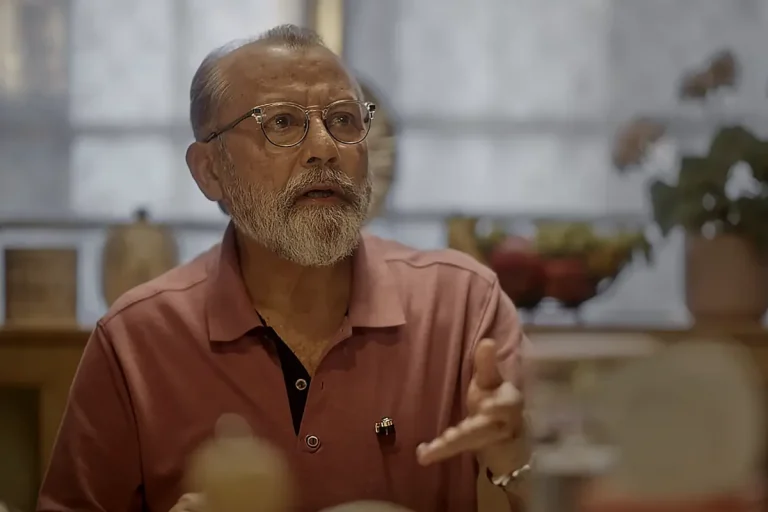Ali Ahmadzadeh’s “Critical Zone” opens with a banger of a sequence. What starts out as a seemingly harmless ambulance drive takes on several shady layers of orchestration as the furiously charged, breathlessly kinetic sequence, zipping through tunnels and highways, forces you to sit up. Once it is off the table, the film slows down, setting us on the back of its protagonist, Amir (Amir Pousti), a drug dealer who makes nightly delivery expeditions to his clients all over the city somewhere in Iran.
Ahmadzadeh’s film has enough audacity to detonate and swish away hardline orthodox representations of his country. While he never makes his intention too conspicuous, the effect nonetheless is dynamic and positively incendiary. Amir is doing what’s considered illegal and potentially risky, which can land him behind bars for life or slap him with a death sentence. But his seedy work almost resembles the form of a salve for people assailed by their situations. In a scene, he ministers the cannabis muffins he has baked to a group of demented elderly patients in a sort of care facility. Every night, guided by his GPS indicator, he swerves right past police, doling out his goodies with brazen single-mindedness.
Though Ahmadzadeh doesn’t spell out the politics, there are bracing flashes of a fuming underside to Amir’s daring nightly spree. We can sense the churn of a society caught in a rot through the obtrusively disorienting sound design by Hassan Mahdavi. A lot of it is jarring. It grates at us. While it initially may be alienating and off-putting, the aural conception in its ruthless discordance, in its proclivity to isolate voices in a separate silo, distending them afar as well as cohering into the scene, gains an upsettingly forceful momentum.
This is the particular demand the film imposes on the viewer. We’ve to wholly and faithfully submit to its often-disconcerting rhythms and let it sink in before picking a bone with its dramatic schema. But Ahmadzadeh is so confident and secure in the bent of his storytelling, giving way to sparks of stylistic brandishing and joltingly garish seeming detours, that he keeps our attention locked on the track, literal and metaphorical, his protagonist takes.

The array of characters and encounters are concentrated in themselves yet wield such a razor-sharp distinctiveness of presence you cannot quite scratch them out each time the film struts to its next pitstop. We don’t get to be intimately acquainted with the lives of all those with whom Amir interacts. The film has short, zippy, volatile bursts of spirit instead of making deep plunges into the intricacies of backstories. Ahmadzadeh trusts us with charting the beats of a fractured, nocturnally vibrant underworld that Amir navigates with a veteran’s practiced ease. Though the screenplay rarely and purposefully skirts his past, we can infer how he has been in this business for so long that he knows all the nuts and bolts of it. This is achieved through the swift dexterity with which the film clues us into its terribly precarious world.
What tails Amir is an ineluctable loneliness. Immersed in his narcotic-fuelled life, he seems to be cut off from healthy, functional relationships. There’s no trace of his family. His dog, amusingly named Mr Fred, is his only companion at home. He and his partner have had a break-up. He still haunts her workplace, pleading with her to at least come back to him at night and sleep next to him. The desperation in his voice is heartbreaking, even if his toxicity couldn’t be more glaring. He is aware there’s no point pursuing his failed romance. So he reassures her she can choose to go out with anyone; all he yearns is for her to be by his side and calm the aching hollow in his heart.
This implacable void is what he actually wishes to run away from. The weight of the world bears down heavily on him. In the mornings, he looks impossibly frazzled, close to a ghost. When someone implicitly asks how he manages to keep his sanity in place after staying home all day, he dismisses her and tells her he has gotten used to it. Instead, he barely looks like he can scrape through the day. I wish the film probed a bit into this half of the day, which he mostly seems to wait out till it’s time for him to hit the streets for his drug dealing. However, Pousti is so peculiarly compelling, often without a scrap of dialogue, projecting an intensity hardly crunched under a lid, that it is almost entrancing.
“Critical Zone” is maddeningly heady, fused with strange delirium. Voices dislodge themselves from characters, drifting off. Characters are lost, helpless, flailing, seething, and crumpling under the burden of circumstances, which plays out as a cleverly masked comment on the splintered society itself. It grants an incredible space to its characters where they can go off the rails in manic outbursts, struggling to contain themselves from the onslaught of their messy, disturbing reality. Boldly, the film primes Amir, who would be prone to incurring the severest punishment by Iranian diktats, as the conduit for people to ease some of their crushing despair or temporarily center themselves after a meander. In its provocatively stylized, visceral register of a slyly mounted pincer-like critique, “Critical Zone” carves out a thrilling, dangerous, radical resistance.



![Repast [1951] Review – A Wonderfully Subtle Marital Strife Drama](https://79468c92.delivery.rocketcdn.me/wp-content/uploads/2020/11/Repast-1951-768x432.jpg)

![Empathy Inc. [2019] Review – An elegant metaphor for the sordid underbelly of mindless materialism](https://79468c92.delivery.rocketcdn.me/wp-content/uploads/2019/09/Empathy-Inc-768x329.jpg)


